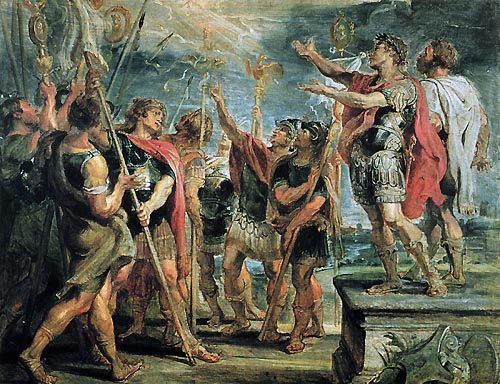In Ancient Rome they believed in the philosophy of
Stoicism. They were called the stoics, because the school's founder, Zeno of Cyprus met his students at the Stoa Poikile on the north side of the market place in Athens.Through rational living and self-control, Zeno and his followers sought to find the source of virtue, and thus happiness, within themselves rather than in external things. The stoics believed that the world is a changing conflagration, or fire, which is limited and ordered by a creative force called Logos, or God. Virtue consists of a man's consciously governing the fires of his action, or desires, by reason. The virtuous man is self-sufficient and undisturbed, this meaning that they were not a slave of circumstances or emotions. Like Socrates, he faces events with calmness, living an honest and rational life. Stoics believed in the kinship and equality of all men, on the grounds that every person possesses a spark of the divine fire, or God. They saw the highest good in the contemplation of God and the universe. The history of Stoicism is divided into three periods called the Old Stoa (300 B.C.-129 B.C.), the Middle Stoa (129 B.C.-30 B.C.), and the Late Stoa (30 B.C.-200 A.D.). During the Late Stoa, the Stoic school shifted from Athens to Rome, where Stoicism stressed the importance of citizenship and honor. Roman Stoics often were advisers to Roman emperors. Stoicism even influenced the Christians in ancient Rome.

Stoicism was the most influential philosophy in the Roman Empire during the period preceding the rise of
Christianity. Marcus Aurelius was among the most famous Stoics of the Roman era, as well as one of the fiercest persecutors of the Roman Christians during his reign as emperor. The Roman stoics influenced Christians then and changed Christianity that is still studied today.

Zeno of Cyprus
Stoicism believed that all people are manifestations of the one universal spirit and should live in brotherly love and readily help one another. They held that differences such as rank and wealth are of no importance in social relationships. Thus, before Christianity, Stoics recognized and advocated the brotherhood of humanity and the natural equality of all human beings. (Durant 975)
The primary duty one owes is to the state, according to Stoicism. Since God is using the Roman state to further law and civilization, performing one's duty is a religious act. The principal being to which one owes respect is, of course, God; since God is working out his will in history by using the Roman state and Roman officials , the respect one shows for Roman authorities is also a respect shown for God. (Durant 301)
Stoicism was in Rome during the Hellenistic Era. After the death of Zeno of Citium, the Stoic school was headed by Cleanthes and Chrysippus, and its teachings were carried to Rome in 155 by Diogenes of Babylon. Stoic ideas appear in the greatest work of Roman literature, and later the philosophy was adopted by Seneca, Lucan, a poet and associate of the Emperor Nero, Epictetus, and the Emperor Marcus Aurelius. Stoicism is perhaps the most significant philosophical school in the Roman Empire, and much of our contemporary views and popular mythologies about Romans are derived from Stoic principles.
In 86, the Roman's excepted the Greek philosophy,
stoicism, with open arms. Many Roman politicians at least adopted the high moral tone of Stoicism according to which only virtue is a genuine good, while money, health and even life itself are simply preferred indifferents. Many famous figures in Ancient Rome were either believed in stoicism or had a person who influenced them that did. Such as Cato the Younger and Scipio Aemilianus. Pompey thought it sufficiently important to look in on the Stoic philosopher Panaetius of Rhodes in his comings and goings. Octavian had a Stoic tutor. Among the Roman emperors, the Stoic philosopher Seneca was the advisor of Nero.
The Greeks followed stoicism before the Romans, but he Romans were a far more practical people than the Greeks, and more skilled at governing. Stoicism became the strongest force in Roman life. The two best known Roman Stoic writers were Epictetus, a slave, and Marcus Aurelius, an Emperor. Perhaps we could best get a feel for their attitudes by reading their words directly for once truth becomes of secondary importance to living then it is feelings and not logical order which tell us the real meaning of a culture.
Ancient Rome was a strong believer in Stoicism and this belief was passed on to the Christians. This shows that Stoicism was a great philiosophy and that it influenced the Christian religion to this day.
Durant, Will. Caesar and Christ. Simon and Schuster, Inc., New York, 1950.
Durant, Will. The Age of Faith. Simon and Schuster, Inc., New York, 1950.

No comments:
Post a Comment